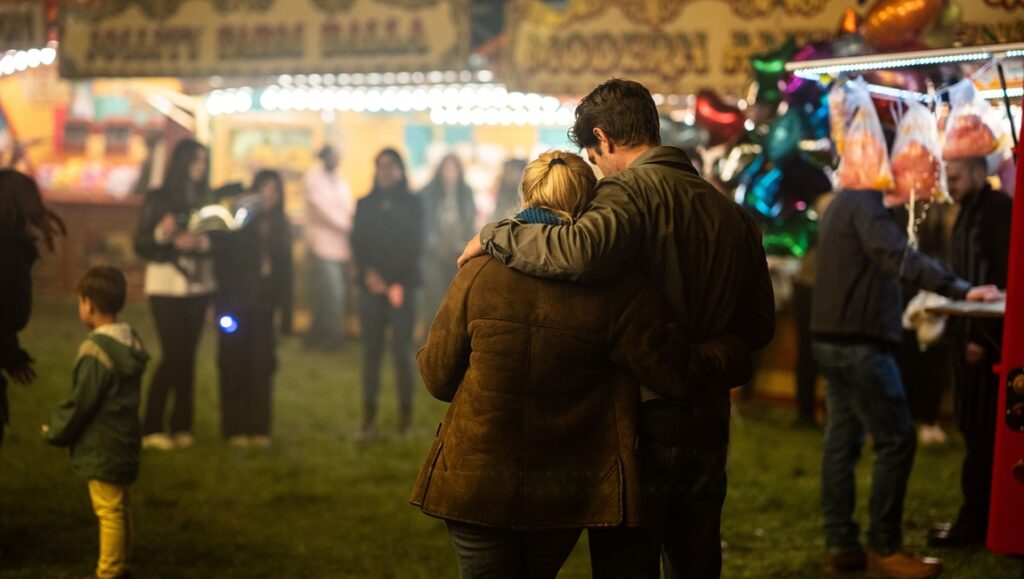The title of A24’s newest tragicomic offering, We Live in Time, recalls the gleeful cliché of romance films from the decade past: The Time Traveler’s Wife (2009), About Time (2013), Time Freak (2018), and, more recently, Needle in a Timestack (2021). The title of John Crowley’ latest entry also states that we are living in a substance called “Time.” But is it the case that we live inside time? Is life a solute and time its solvent? What the title suggests, then, is that with no time, there is no life. But if there is no life, is there still time?
We Live in Time is Crowley’s first film since the spectacular disaster of The Goldfinch (2019), a misarticulation so severe it compelled Donna Tartt to part ways with her agent of many decades. In it, Crowley trains his lens on Tobias (Andrew Garfield), a bleary-eyed mid-level Wheatabix manager who becomes besotted by Almut (Florence Pugh) — a former Olympic-level figure skater who has traded her leather blades for Japanese metal-wear in the world of Michelin-star restauranteuring — after she accidentally hits him with her car (on the eve of his divorce, no less). What follows is a remarkably rote marriage plot hinged on the tension of one party’s desire for children (Tobias) and one party’s apparent indifference to them (Almut). However, matters are complicated by a trivial conceit that simultaneously defuses any tension in the marriage plot while introducing the new, no-more original illness plot affixed to Almut’s recurrent diagnosis of ovarian cancer.
We Live in Time scrambles three temporal threads that follow the beginning of Almut and Tobias’s relationship, the third trimester of Almut’s pregnancy, and the relapse of Almut’s illness, respectively. Each thread is braided into a series of juxtaposing beats. For instance, a succession of sequences render a heavily pregnant Almut anticipating the birth of her child, a heavily ambivalent Almut yelling about her desire never to have children, and an ailing Almut resting in the love of her husband and daughter. By the logic of “We Live in Time,” time itself is much less a relative measure of change than it is a coordinate system of eternal moments, affixed to respective coordinates along a multi-dimensional plane, all happening at the same time.
Like many other films of its melodramatic ilk, We Live in Time’s employment of music en scene borders on the abusive. Moments of tension — whether of intimacy or conflict — are never given a moment to breathe before Bryce Dessner’s overwrought score first blankets them and then snuffs them out. This is particularly unfortunate given the chemistry that Garfield and Pugh carry from scene to scene, an endearing sort of gender-role reversal where Pugh takes the dominant role and Garfield is expected to keep up. To this end, Garfield’s Tobias is never rounded to anything beyond a weepy appendage the follows Almut around, herself being so complex in motivation and interests that you can’t help but wonder: why is she with him? Even in moments when you feel like you might be beginning to understand their union, and it feels as though their relationship might locate a new depth, their voices seem to fade and, wait for it, there comes the sound of droning music, distancing the viewer from the couple, and scrubbing the film’s finish to the cheapened quality of an eau de parfum ad.
In every facet, this is a film that is too tidy and ordered for its own good. The very conceit of its disordered timeline is itself only a superficial rearrangement; while there is no linearity in the presentation of events, there is still clear linearity of cause. Crowley’s architecture, then, does away with building tension from a cause (inciting incident) whose outcome is uncertain, while also doing away with the possible tension enabled by his trite format that could, hypothetically, reverse the orientation of viewers’ desire; that is, to have us searching, not for the effect of a cause, but for the cause of an effect. Instead, Crowley shows us the reactions of Almut and Tobias before the actions themselves, disappointingly providing answers to questions before they are even asked.
DIRECTOR: John Crowley; CAST: Andrew Garfield, Florence Pugh, Adam James, Aoife Hinds; DISTRIBUTOR: A24; IN THEATERS: October 11; RUNTIME: 1 hr. 48 min.


Comments are closed.